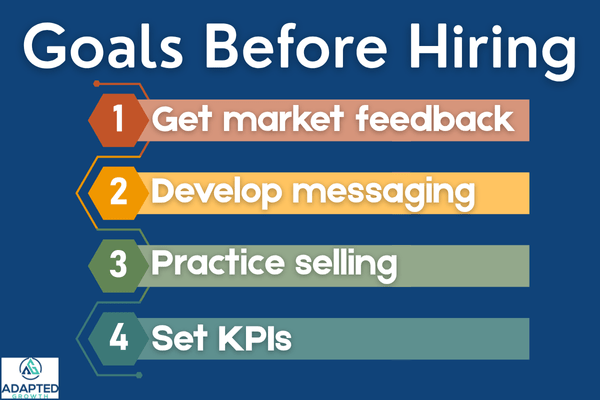When you’re running a small business, you don’t have the luxury of separate teams or sales vs. marketing conflicts. You have to understand and do both.
But if you come from a background in only one of them (or neither!), it can be a huge challenge to figure out where to focus your limited time and energy.
Do you need better messaging? More leads? Better conversion? How do you know if you’re struggling with a sales problem or a marketing problem?
By breaking down the core differences between sales vs. marketing, you’ll gain a better understanding of what role they play when you’re selling for yourself. Most importantly, you’ll avoid the common mistakes that stall early growth by knowing how the two go hand-in-hand for a more reliable and successful sales process.
Sales vs. Marketing — Why Many Founders Lean One Way or the Other
Most founders tend to focus more on either sales or marketing, rarely both. This preference usually stems from their professional background.
Founders with Sales Backgrounds
- Pros — They are typically comfortable with direct conversations, naturally good at building relationships, often eager to ask questions to uncover pain, and quick to adapt messaging based on real feedback.
- Cons — Former salespeople often jump straight to cold outreach without validating the market, skip foundational marketing work, and risk burning out networks too soon.
Founders with Marketing Backgrounds
- Pros — Former marketers are strong at understanding positioning, brand-building, and attracting inbound leads over time. They also tend to be more patient when building a client base and refining the right messaging.
- Cons — Unfortunately, direct selling is usually not their default mode. They can also spend too much time perfecting messaging before testing it in the market, and risk over-complicating early-stage efforts.
Both skillsets have incredible strengths that are vital to a new business. However, neither can build a scalable business without the other.
The key for founders is recognizing your bias and learning to balance both roles effectively.

Founders Default to Their Comfort Zone
Without a team, most founders naturally spend more time on the tasks that feel safest.
If you love creating content, you may over-invest in marketing, thinking it will sell your product for you. (It seldom does.) If you enjoy pitching, you’ll lean too hard into talking about features and benefits before understanding what your target market actually needs.
Most detrimentally, if you hate both, you might avoid customer-facing work altogether. This issue can lead to never targeting a specific market at all, never knowing what messaging resonates with people, and possibly never even knowing if you have a viable product — all problems that can cause a business to fail.
The early-stage risk usually isn’t poor execution — it’s lopsided focus.
Before you hire a salesperson or marketer, strive to hit these goals first:
- Get direct market feedback about the wants, needs, expectations, and viability of your product.
- Develop simple and clear messaging that reflects market feedback.
- Practice real sales conversations with peers before having them with leads.
- And know which activities (or KPIs) actually generate revenue, both directly and indirectly.
You don’t need to master every channel or have this dialed in to a sales machine. But creating a simple, focused system that you can execute consistently is the foundation for a successful business.

How Do Sales and Marketing Work Together?
In large organizations, sales and marketing fight over budget, leads, and credit. However, in small businesses, the fight often takes place inside the founder’s head.
Here’s the simplest way to think about it as a founder:
- Marketing helps you figure out what to say and how to get noticed.
- Sales helps you turn newfound attention into paying customers.
It’s about shifting your viewpoint from sales vs. marketing to seeing them as two sides of the same coin.
When both are working together—even if you’re doing it solo—you can speak directly to your market’s pains and goals, show up where they already are, and have confident, natural sales conversations that convert without feeling forced.
Start with market research:
- Talk to customers and peers about what they perceive as the benefits and uniqueness of your product. Does it meet what they want, need, and expect? How is it different from past experiences? What is most impactful for them and why?
- Review competitor messaging to find what works and how you can confidently differentiate yourself.
- Uncover the emotional triggers that sell products by learning what your ideal buyers worry about and how solutions (yours and similar) improve their lives and businesses.
Build simple, specific messaging based on those insights. Then practice selling with that messaging, testing what resonates in sales conversations. (The best way to test your messaging and communication skills is to join Sales Practice Lab or something similar. You get honest feedback from fellow founders and marketers without worrying about losing deals or wasting leads.)

Quick Guide: Is It a Sales Problem or a Marketing Problem?
If you feel stuck, this quick check can help you decide where to focus:
| If you’re struggling with… | You likely have a… |
| No one responding to outreach | Marketing problem (weak messaging or targeting) |
| Getting calls but no closes | Sales problem (poor qualification or discovery) |
| Low awareness in your market | Marketing problem (need visibility and lead generation) |
| Lots of interest but no commitment | Sales problem (weak follow-up, unclear next steps) |
| Endless “thinking about it” responses | Could be both—check your positioning and your closing skills |
Founder’s Tip: If you haven’t already, start using a CRM immediately, and track your leads from acquisition through your sales cycle. This will help you uncover and resolve these struggles much more quickly!

Start Fixing the Sales vs. Marketing Problem Today
You don’t need a polished sales funnel or a huge marketing strategy to get results. You need clarity on your market, your message, and how to lead prospects toward a confident ‘yes’ or a clear ‘no’.
This clarity only comes from utilizing a united sales and marketing focus. Once you build that foundation, you’ll be able to:
- Hire the right kind of help (sales or marketing) when the time comes.
- Train people faster.
- And avoid costly mistakes, such as overbuilding before you’ve validated what works.
Plus, once you scale to the point where you need full teams, you won’t have to worry about the sales vs. marketing conflict that other companies struggle with. You’ll already have a harmonious and positive sales culture that’ll continue to grow with your business.
If you’re a founder figuring this out for yourself and want to hone your messaging and build a repeatable sales approach before hiring, let’s talk.










